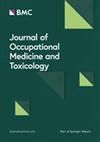重症哮喘患者的生活质量和工作功能:生物疗法的影响
IF 2.7
4区 医学
Q2 PUBLIC, ENVIRONMENTAL & OCCUPATIONAL HEALTH
Journal of Occupational Medicine and Toxicology
Pub Date : 2024-03-20
DOI:10.1186/s12995-024-00406-9
引用次数: 0
摘要
严重哮喘可导致健康状况不良、与健康相关的生活质量(HRQoL)低下以及工作功能受损。然而,迄今为止,有关生物疗法对这些结果的影响的数据十分有限。因此,本研究旨在前瞻性地评估重症哮喘患者在基线和接受生物疗法 6 个月后的临床、生活质量和工作功能问题,并确定哪些个人、病理和职业因素会影响这些参数。52 名患者于 2022 年 12 月至 2023 年 6 月期间入组。对患者的个人、临床、功能和职业特征进行了评估。采用简表健康调查(SF-12)、工作生产率和活动障碍(WPAI)问卷和工作能力指数(WAI)分别评估患者的 HRQoL、员工的生产率和对工作能力的感知。入组患者中有 30 人(57.70%)有工作。生物疗法显著改善了工人和非工人的临床和功能参数,如FEV1%(72 ± 12 vs. 87 ± 13%;72 ± 14 vs. 86 ± 14%)、FVC%(92 ± 11 vs. 101 ± 11%;90 ± 13 vs. 98 ± 14%)和FEV1/FVC(62 ± 11 vs. 71 ± 8%;64 ± 9 vs. 70 ± 8%)(P < 0.001)。相比之下,生活质量感知明显改善,总体组群的身体和心理健康得分分别从 40.7 ± 10.3 和 48.5 ± 8.5 提高到 46.8 ± 8.6 和 51.6 ± 6.4(P < 0.001)。工作能力感知明显改善,从中等提高到良好(34 ± 6 vs. 40 ± 6,P = 0.001)。缺勤率(19 ± 15 vs. 3 ± 11%;P < 0.001)和旷工率(53 ± 24 vs. 29 ± 26%;P < 0.001)明显降低,日常活动(40 ± 27.5% vs. 28.9 ± 24.7%,P < 0.001,总体人群)和工作活动(57 ± 25 vs. 29 ± 27%,P < 0.001)得到改善。性别、年龄、症状控制和肺功能与身心健康感知、日常活动障碍和工作能力相关。我们的研究表明,生物疗法可改善重症哮喘患者的临床、一般生活和职业状况。临床方面与心理和职业问题之间的相关性表明,对疾病进行多学科管理对于患者有效参与工作具有重要意义。本文章由计算机程序翻译,如有差异,请以英文原文为准。
Quality of life and work functionality in severe asthma patients: the impact of biological therapies
Severe asthma can cause poor health status, poor health-related quality of life (HRQoL) and an impaired functioning at work. However, to date, limited data are available on the impact of the biological therapies on such outcomes. Therefore, aim of the present study was to prospectively assess the clinical, quality of life and work functionality issues in severe asthma patients both at baseline and after 6 months of biological therapies and determine which individual, pathological and occupational factors can influence such parameters. Fifty-two patients were enrolled between December 2022 and June 2023. Patients’ personal, clinical, functional and occupational features were assessed. The Short Form Health Survey (SF-12), the Work Productivity and Activity Impairment (WPAI) questionnaire and the Work Ability Index (WAI) were employed to assess HRQoL, the employee’s productivity and perception of work ability, respectively. Among the enrolled patients, 30 (57.70%) were employed. Biological therapy induced a significant improvement in clinical and functional parameters, e.g., FEV1% (72 ± 12 vs.87 ± 13%; 72 ± 14 vs. 86 ± 14%), FVC% (92 ± 11 vs. 101 ± 11%; 90 ± 13 vs. 98 ± 14%) and FEV1/FVC (62 ± 11 vs. 71 ± 8%; 64 ± 9 vs. 70 ± 8%) in workers and non-workers, respectively (P < 0.001). Comparably, the perception of life quality significantly improved, as physical and mental health scores, in the overall cohort, increased from 40.7 ± 10.3 and 48.5 ± 8.5 to 46.8 ± 8.6 and 51.6 ± 6.4, respectively (P < 0.001). The work ability perception significantly improved from a moderate to a good one (34 ± 6 vs. 40 ± 6, P = 0.001). A significant reduction in the absenteeism (19 ± 15 vs. 3 ± 11%; P < 0.001) and presenteeism rate (53 ± 24 vs. 29 ± 26%; P < 0.001), and an improvement in daily (40 ± 27.5% vs. 28.9 ± 24.7%, P < 0.001, in the overall population) and work activities (57 ± 25 vs. 29 ± 27%, P < 0.001) was determined. Gender, age, symptoms control and pulmonary functionality were correlated with the physical and mental health perception, daily activity impairment and work ability. Our study pointed out that biological therapies improved clinical, general life and occupational outcomes in patients with severe asthma. The correlation between clinical aspects and psychological and occupational issues suggest the relevance for a multidisciplinary management of the disease for an effective participation of patients in the world of work.
求助全文
通过发布文献求助,成功后即可免费获取论文全文。
去求助
来源期刊

Journal of Occupational Medicine and Toxicology
PUBLIC, ENVIRONMENTAL & OCCUPATIONAL HEALTH-
CiteScore
6.00
自引率
0.00%
发文量
23
审稿时长
19 weeks
期刊介绍:
Aimed at clinicians and researchers, the Journal of Occupational Medicine and Toxicology is a multi-disciplinary, open access journal which publishes original research on the clinical and scientific aspects of occupational and environmental health.
With high-quality peer review and quick decision times, we welcome submissions on the diagnosis, prevention, management, and scientific analysis of occupational diseases, injuries, and disability. The journal also covers the promotion of health of workers, their families, and communities, and ranges from rehabilitation to tropical medicine and public health aspects.
 求助内容:
求助内容: 应助结果提醒方式:
应助结果提醒方式:


